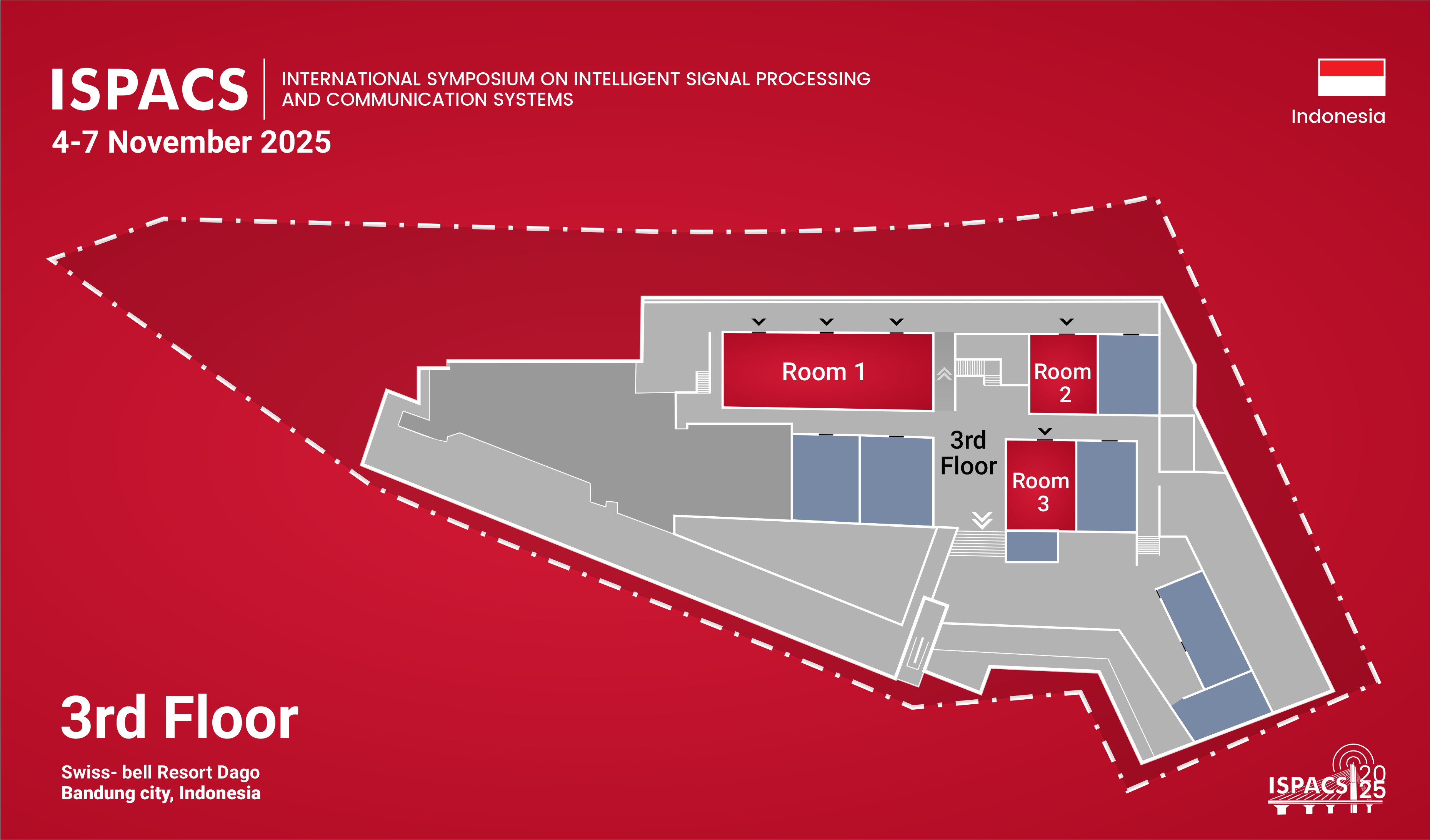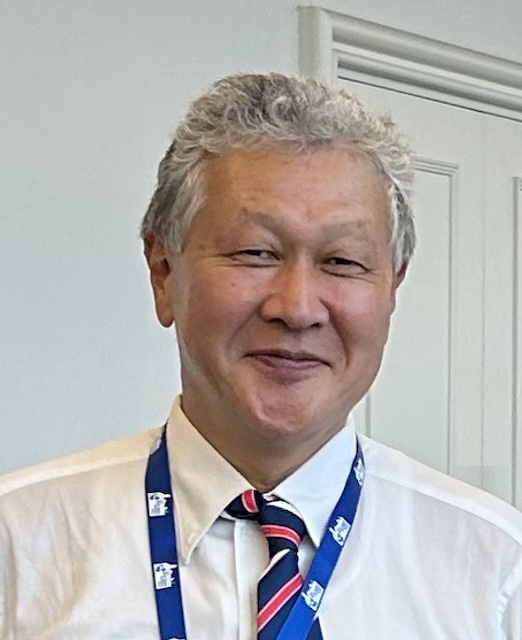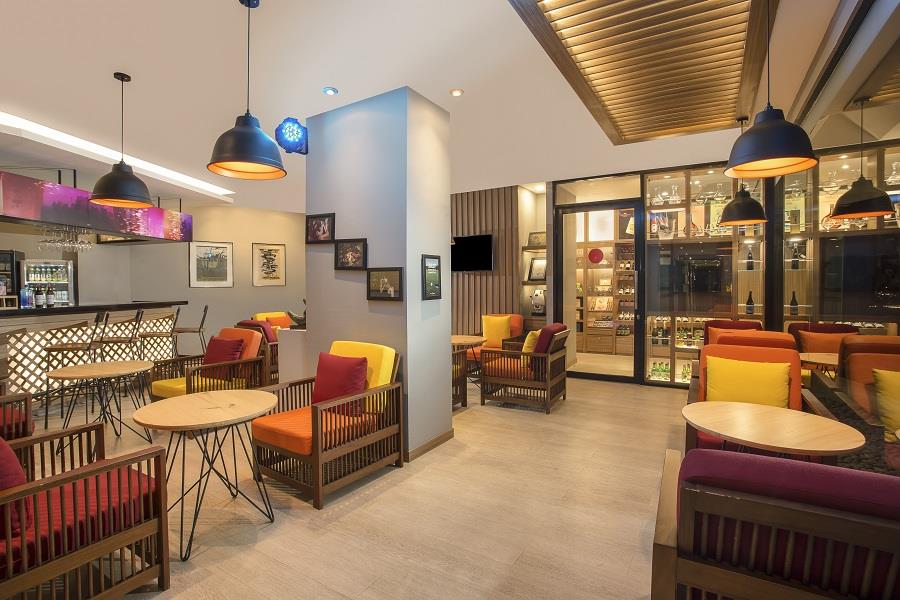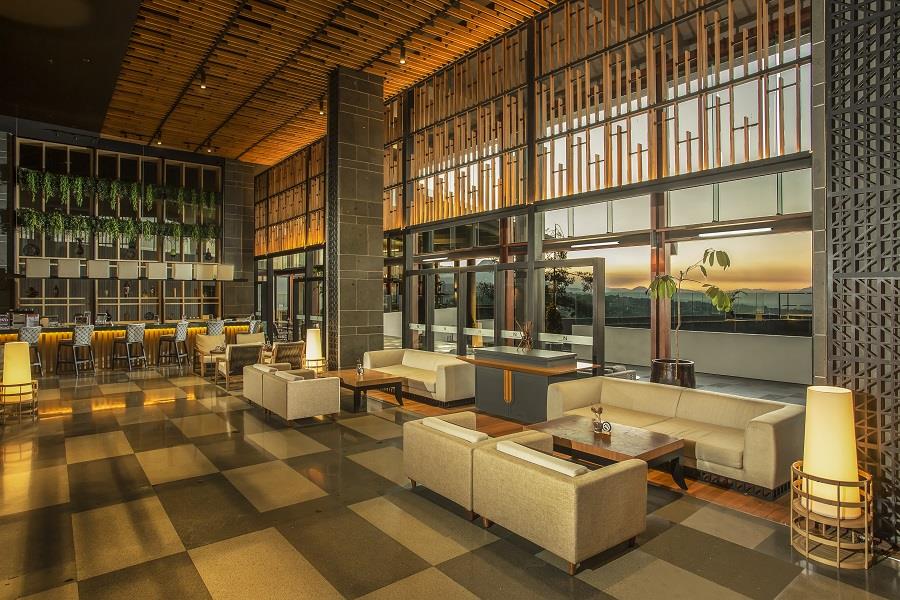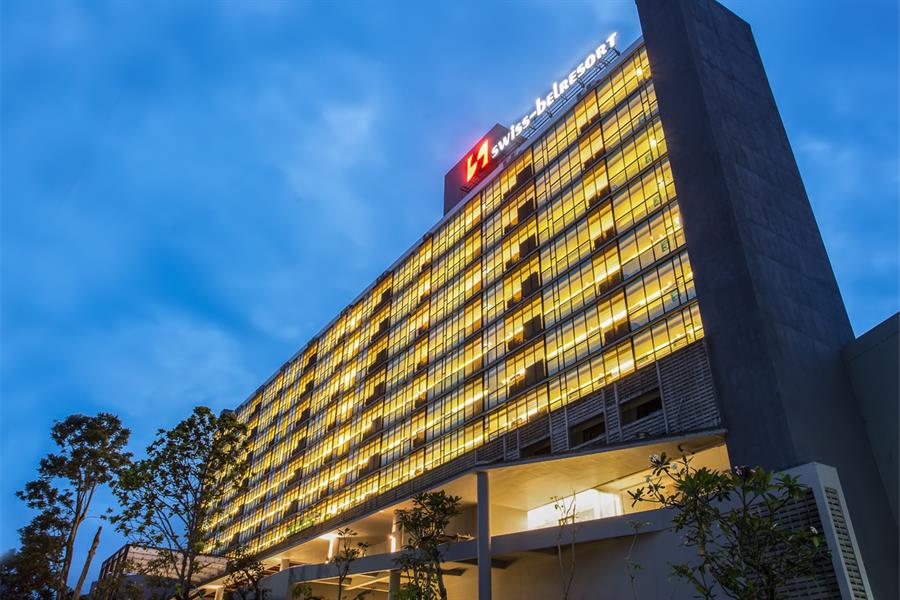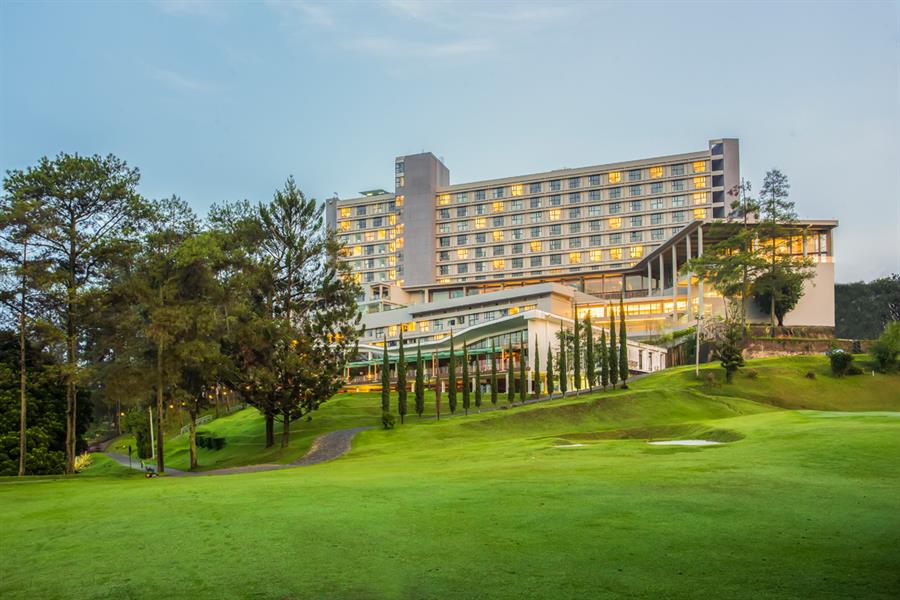Manuscript Guidelines
Manuscript must be prepared in English with a maximum length of four (4) to six (6) printed pages IEEE format (ten-point font) including figures. The symposium maintains the right to refrain from reviewing papers that are longer than 6 pages. For your submission you can use the standard IEEE conference templates for Microsoft Word or LaTeX formats which can be found at: IEEE Manuscript Template.
The format for the manuscript must satisfy the following requirements:
- Manuscript must be in English.
- The manuscript must follow IEEE two-column format with single-spaced, ten-point font in the text. The maximum manuscript length is four (4) to six (6) pages. All figures, tables, references, etc. are included in the page limit.
- Papers must be submitted in Portable Document Format (PDF).
- Papers must be formatted for standard letter-size (8.5″ x 11″) paper.
- Authors must submit their papers electronically via paper submission system.
PDF eXpress Guidelines
Before creating a PDF
Proofread your source document thorougly to confirm that it will require no revision.
Copyright Information
Write the copyright detail on the bottom left of first page. The detail:
- For papers in which all authors are employed by the US government, the copyright notice is: U.S. Government work not protected by U.S. copyright
- For papers in which all authors are employed by a Crown government (UK, Canada, and Australia), the copyright notice is: 979-8-3315-8066-7/25/$31.00 ©2025 Crown
- For papers in which all authors are employed by the European Union, the copyright notice is: 979-8-3315-8066-7/25/$31.00 ©2025 European Union
- For all other papers the copyright notice is: 979-8-3315-8066-7/25/$31.00 ©2025 IEEE
Creating PDF eXpress Account
- Login to the IEEE PDF eXpress® site.
- First-time users should do the following:
- Create account
- Enter the following:
- 68724X for the conference ID
- your email address
- a password
- Continue to enter information as prompted.
An online confirmation will be displayed, and an email confirmation will be sent verifying your account setup.
- Previous users of PDF eXpress need to follow the above steps but should enter the same password that was used for previous conferences. Verify that your contact informations is valid.
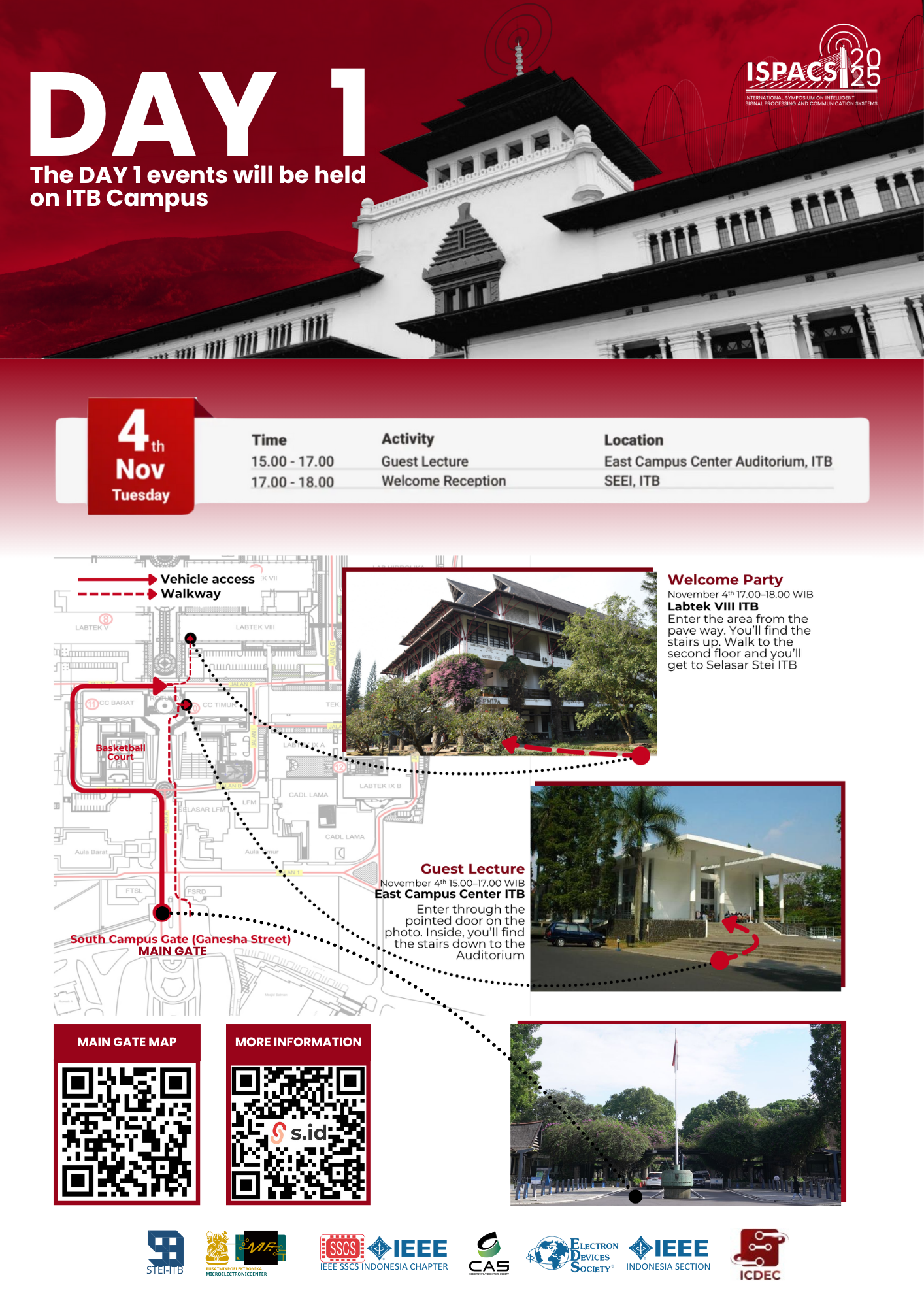
News
Registration for BATCH 1 will be open on September 11th, 2025. You can read the Registration Guidelines here.
Notifications of acceptance for BATCH 1 have been sent to authors. Congratulation for authors with accepted paper. Please refer to the authors for camera-ready paper guidelines.
The camera-ready paper submission deadline is extended to September 15th, 2025.
While preparing for the camera-ready paper, authors can register for the conference. Details of registration can be read at registration.
The notification of acceptance of BATCH 1 is postponed to August 31st, 2025.
Full paper submission deadline for BATCH 1 has passed. We will send the notification of acceptance on August 12th, 2025.
We are opening BATCH 2 for full paper submission for regular and special sessions until September 10th, 2025.
To accommodate author’s requests, we have extended the deadline to July 30th, 2025.
There will be four special sessions in ISPACS 2025. Check on: Special Sessions
About
The International Symposium on Intelligent Signal Processing and Communication Systems (ISPACS) is the premier networking forum of leading researchers especially from Asia-Pacific based in the highly active fields of theory, design and implementation of intelligent signal processing and communication systems. ISPACS 2025 will be held in Bandung, Indonesia from 4th to 7th November 2025. The symposium presents every possibility on new technologies based on signal processing and communication.
ISPACS has been held since 2004. Proceeding of previous ISPACS can be found at IEEEXplore.
Important Dates
BATCH 2
- Submission of regular and special session paper deadline: September
10th20th, 2025 - Notification of acceptance: October 5th, 2025
- Camera-ready paper submission deadline: October 20th, 2025
BATCH 1
- Submission of regular & special session papers deadline: July
10th20th30th, 2025 - Notification of acceptance: August 31st, 2025
- Camera-ready paper submission deadline: September 15th, 2025
SPECIAL SESSIONS
- Special session proposals deadline: May 31st, 2025
- Notification of acceptance for proposals: June 6th, 2025
Conference Date: November 4-7, 2025
ADVANCE PROGRAM
| Date | Time (GMT +7) | Activity | Note |
|---|---|---|---|
| Tuesday, November 4, 2025 | 15.00 - 17.00 | Guest Lecture | East Campus Center Auditorium ITB |
| 17.00 - 18.00 | Welcome Reception | School of Electrical Engineering and Informatics ITB | |
| Wednesday, November 5, 2025 | 07.30 - 08.30 | Registration | |
| 08.30 - 09.00 | Opening Speech | ||
| 09.00 - 10.00 | Keynote Speech 1 | Prof. Akira Hirose | |
| 10.00 - 10.30 | Coffee Break | ||
| 10.30 - 12.00 | Parallel Session 1 | ||
| 12.00 - 13.00 | Lunch Break | ||
| 13.00 - 14.00 | Keynote Speech 2 | Prof. Seishi Takamura | |
| 14.00 - 15.30 | Parallel Session 2 | ||
| 15.30 - 16.00 | Coffee Break | ||
| 16.00 - 17.30 | Parallel Session 3 | ||
| Thursday. November 6, 2025 | 08.00 - 09.00 | Registration | |
| 09.00 - 10.00 | Keynote Speech 3 | Prof. Arif Sasongko | |
| 10.00 - 10.30 | Coffee Break | ||
| 10.30 - 12.00 | Parallel Session 4 | ||
| 12.00 - 13.00 | Lunch Break | ||
| 12.00 - 13.00 | ISPACS Steering Committee Meeting | ||
| 13.00 - 14.30 | Parallel Session 5 | ||
| 14.30 - 15.00 | Coffee Break Poster Session 1 | ||
| 15.00 - 16.30 | Parallel Session 6 | ||
| 16.30 - 17.00 | Poster Session 2 | ||
| 17.00 - 18.00 | Keynote Speech 4 | Prof. Hanjun Jiang | |
| 19.00 - 21.00 | Gala Dinner | Sinom Room 2nd Floor | |
| Friday, November 7, 2025 | 08.00 - 08.30 | Farewell Reception | |
| 08.30 - 13.00 | Tour | Dusun Bambu |
PARALLEL SESSION
| Date | Time | Parallel Session | Room 1 | Room 2 | Room 3 |
|---|---|---|---|---|---|
| Wednesday, November 5, 2025 | 10.30 - 12.00 | 1 | SPAIoT1 | COM | SP1 |
| 14.00 - 15.30 | 2 | SPAIoT2 | SPOS | SP2 | |
| 16.00 - 17.30 | 3 | SPQIP | ETSP | SP3 | |
| Thursday, November 6, 2025 | 10.30 - 12.00 | 4 | SPAIoT3 | . | SP4 |
| 13.00 - 14.30 | 5 | VLSI | MED | WirelessApp | |
| 15.00 - 16.30 | 6 | SPDig | HCl | SysApp |
SESSION GROUPS
| Session ID | Paper ID | Title |
|---|---|---|
| . | 957 | Brain Tumor Detection for Highly Scarce MRI Images Using Synthetic Data |
| 4739 | Detection of Infected Areas on Pulai Leaves through Trainable Weka-Based Image Segmentation | |
| 4926 | Short-term electricity demand forecasting using an integrated CNN-Transformer-LSTM model | |
| 9374 | Intelligent Agent-Driven Test Artifact Synthesis with Dynamic Environmental Feedback | |
| 2341 | Comparative Evaluation of Synthetic Question and Answer Dataset Generation Methods for Large Language Model | |
| 2911 | VALID-Mol: A Systematic Framework for Validated LLM-Assisted Molecular Design | |
| COM | 1291 | Digital Twin-Aided Fingerprinting for Device-Free RF Sensing |
| 2709 | Energy-based Performance Evaluation of Mobile Wireless Ad hoc Routing Protocols | |
| 2748 | A Compact Super Wideband Slot Antenna for Wireless Applications | |
| 3596 | Low-Power Spoof-to-Jam Vulnerability in Satellite Terminals | |
| 5218 | Pareto-Optimal Design of OAM Communication Links under Beam Misalignment via a Decomposition-Based CMOEA | |
| ETSP | 9405 | Prune-Q: A Pruning-Quantization Method for Resource-Constrained Environment Using The CICIDS2017 Dataset |
| 9939 | Feasibility Study of Telecommunication Network Development in the Capital City of Nusantara | |
| 7575 | Vibration Tomography to Monitor Internal Tree Structrute Using Corellated Signals (Terawang V2) | |
| 5107 | Design of Bi2O3/ SiO2 Based on 1D Symmetric Photonic Crystal Defect Sensor to Detect Lard Mixture in Coconut Oil | |
| 4815 | A Methodological Framework for Assessing the Market Viability of GaN-based Power Electronics in Emerging Economies: A Case Study for Indonesia | |
| HCI | 2 | UX-Guided IoT-Based Learning Platform for Informal Entrepreneurship Training in Indonesian PKBM: A Human-Technology Symbiosis Approach |
| 7745 | Just Dork and Crawl: Measuring Illegal Online Gambling Defacement in Indonesian Websites | |
| 8104 | Advancing Embedded AI: Implementation and Optimization of Deep Neural Networks on Bare-Metal Device Using Lightweight Non-OS Programming | |
| 6473 | R-CICIDS2017: Making the IDS Benchmark Realistic for Quantized Models in IoT Deployments | |
| 6284 | Privacy-Preserving Credit Scoring using CKKS-Based Fully Homomorphic Encryption | |
| 773 | Development Of A Digital Product Design For Customer Onboarding Operational System By Applying The Usability Heuristics Method | |
| MED | 755 | Template Subtraction-Based Extraction of Fetal Electrocardiogram and Analysis of Heart Rate Variability |
| 2299 | Automatic Non-Invasive Kidney Function Detection for Female Patient | |
| 6996 | A Machine Learning Approach for Diabetes Mellitus Prediction Using Hemodynamic and Vascular Stiffness Parameters | |
| 1099 | Designing an Electrochemical Biosensor Output Reading by Modelling the Electrochemical Cell System and Designing a 90nm CMOS Transimpedance Amplifier with Self-Biasing | |
| 5699 | Design and Construction of a Fall-Mitigation Device for the Elderly | |
| 729 | Hyper-Personalized Feedback for Clinicians: A Computational Empathy Analysis of Patient-Doctor Dialogues | |
| SPAIoT1 | 7233 | Efficient Architecture for CNN Accelerator using Depthwise Separable Convolution and Operand Isolation Multipliers |
| 695 | Asynchronous Non-binary SAR ADC Inspired by Hopfield Network | |
| 977 | Two-Stage Multi-Objective Bayesian Optimization Framework for Analog Circuit Sizing | |
| 2113 | Reducing Simulation Overhead in Analog Circuit Sizing via Stage-Aware Multi-Fidelity Optimization | |
| 8154 | CSI-Driven Wireless Sensing for Human Presence Detection Using Convolutional Neural Networks | |
| SPAIoT2 | 2437 | Power line component detection using quantized YOLO for resource-constrained single-board computer |
| 2723 | Accelerating Phase-Lock-Loop Design via Circuit-Level Partitioning and Bayesian Optimization | |
| 2941 | Asynchronous cyclic ADC using a multistage zero-crossing based amplifier | |
| 2975 | Low-voltage-compatible low-frequency clock multiplier circuit using monostable multivibrators | |
| 3079 | Clock Recovery Circuit Based on Commercial Frequency for Microsystems | |
| SPAIoT3 | 3660 | Design and Implementation of an Inline Array Architecture for Variational Autoencoders Accelerator |
| 3875 | A 0.03 mm2, 1.1 pJ/bit, 25 Gb/s Active-voltage Current-feedback Based Transimpedance Amplifier in 65 nm CMOS | |
| 5356 | A 0.55-1.1GHz Fast Locking All-digital Delay Locked-Loop using Course-Fine Time-to-Digital Converters | |
| 7883 | In-situ Measurement of the Digital Circuit Operation using Multi-Output MOSFET for the IoT Circuits | |
| 8740 | Tunable third-order Butterworth filter | |
| SPDig | 5749 | Transfer Learning Mechanism for Fast Learning of DQN algorithm in Dynamic Maze Environment |
| 6701 | Estimation of Glucose Concentration using Machine Learning | |
| 2623 | Towards Long-sequence Image-to-Video Generation: A Multi-stage Diffusion Framework for Temporal and Motion Consistency | |
| 5304 | A Study on Lightweight YOLO-Based Object Recognition Systems: A Case Study of Automated Duck Egg Quality Classification | |
| 2918 | Variable Step-Size Modified One-Tap Affine-Projection Algorithm for Adaptive Null-Forming in Digital Hearing Aids | |
| SPOS | 5850 | A Time-Domain Comparator-Based 10-Bit SAR-ADC Design for Photoplethysmogram Signal Recording Using SkyWater 130 nm and Open-Source Tools |
| 7016 | A Ring-Oscillator-Based 2.4 GHz Integer-N PLL Design in SkyWater 130nm Open-Source Technology | |
| 9703 | A 10-Bit 100-kHz Partially Segmented DAC Design for LCD Gamma Correction Using Open-Source EDA Tools | |
| 7106 | A Silicon-Proven Wide-Range Voltage Controlled Oscillator Designed Using Open-Source CMOS 130nm PDK | |
| 5105 | Design of a Low‑Noise Amplifier for 2.4 GHz Wi‑Fi Positioning Using 45 nm CMOS Technology | |
| SPQIP | 691 | Data Augmentation Effectiveness Analysis On Improving QCNN Algorithm Performance |
| 801 | Evaluating Encoding Strategies and Quantum Circuit Designs for Sentiment Classification | |
| 1941 | Multi-Class Line Position Detection using Hybrid Quantum Convolutional Neural Network | |
| 9474 | Design and Implementation of Quantum Convolutional Neural Networks for Handwritten Character Classification | |
| 9318 | A Study and Exploration of Hyperparameters in Quantum Convolutional Neural Networks | |
| SysApp | 4189 | Drug Dosage of Immune System Using Reinforcement Learning |
| 5091 | Tracking-Enabled Antenna System for Low-Earth Orbit Satellite Communication | |
| 5316 | Robotic Gait Training for Cerebral Palsy Therapy | |
| 7551 | Design and Simulation of a Symmetric 1D Photonic Crystal Biosensor for Detecting Honey Adulteration with Liquid Sugar | |
| SP1 | 5585 | A Comparison Between Simultaneous and Sequential Multitask Learning for Wireless Signal Classification and Reconstruction |
| 5906 | Addressing Class Scarcity and Imbalance for Few-Shot Detection of Wind Turbine Blade Surface Defects | |
| 7036 | Air Pressure Sensor Data ImputationModels of Automatic Weather ObservationSystemforReliable Aviation Wea | |
| 112 | Air Temperature Estimation Using Multivariable Analysis and Various Algorithm on Automatic Weather Station | |
| 5713 | Accuracy Evaluation of a Streaming-Based Resource-Efficient Mel Filter Bank Architecture with Fixed-Point Based Design Approaches | |
| SP2 | 5626 | Enhancing Frequency Hopping Resilience: A Secure PN Sequence-Based Anti-Jamming Framework |
| 3364 | FPGA-based End-to-End Secure Audio Communication Using Frequency Permutations | |
| 975 | A consideration of data augmentation methods for improving the accuracy of music removal from environmental sounds using machine learning | |
| 4232 | A Proposal of Adaptive Direct blind equalization with Noise Variance Estimation for OFDM Environment | |
| 4267 | Dual Point Control with Virtual Sensing Technique in Active Noise Control | |
| SP3 | 3935 | BiMER: Rethinking Multimodal Emotion Recognition with Bidirectional Representation Learning |
| 4859 | Proposal of Pulse Wave Extraction Method Based on Pulse Wave Selection Method Using Adaptively Calculated Kurtosis and Skewness | |
| 8332 | The Generation of Two-scale Sequence Generating Arbitrary Mother Wavelet with High Accuracy in Discrete Wavelet Transform Using Machine Learning | |
| 8398 | A Method for Estimated Respiratory Rates of Supine Patients Using a Pose Estimation Function | |
| 8584 | Design and Simulation of Photonic Crystal Sensor with Defect to Detect Lard Adulteration in Olive Oil | |
| SP4 | 5942 | Comparative Analysis of KNN and SVM Classifiers for Brain Tumor Detection Using GLCM, Shape, and Color Features |
| 9255 | Automatic Emotion Recognition System based on Convolutional Neural Network for Speech to Speech Japan-Indonesia Translation | |
| 53 | Portable ECG Monitoring System for Early Detection of Cardiovascular Abnormalities | |
| 831 | Automated Image Description Using VisualGPT: Case Studies on Fashion Products | |
| 2297 | Embedded system design for heart condition Identification based on signal characteristics | |
| VLSI | 6050 | Evaluation of Bit-Width Effects in Fixed-Point FPGA-Optimized MFCC Computation via Software Simulation for HMM-Based Phrase Speech Recognition |
| 880 | Design and Implementation of ISO/IEC 14443 Type-A Contactless Smart Card Serial Communication Coprocessor with 8051 Microcontroller on FPGA | |
| 9608 | A 17.28-GHz 509.5-fs Jitter Charge-Pump PLL with Third-Order Loop Filter and LC-VCO in 40-nm CMOS | |
| 8459 | Proposal of a simple perceptron circuit based on Neuron-CMOS with adjustable weights | |
| 9230 | AXI-Integrated Reconfigurable Pooling Engine: Design and Verification for High-Efficiency Data Processing with AXI VIP | |
| WirelessApp | 2896 | Determination of Tsunami Evacuation Routes at Pangandaran Beach Using Dijkstra, Modified Dijkstra, and Ant Colony Optimization |
| 7384 | Comparative Evaluation of ROI Selection and Signal Extraction Methods in Remote Photoplethysmography for Heart Rate Monitoring | |
| 2316 | Obstacle Detection using Machine Learning for Visually Impaired Adaptive White Cane | |
| 3165 | Development and Evaluation of Wearable Heart Rate Variability Monitoring System | |
POSTER SESSION
| # | Paper ID |
|---|---|
| 1 | 453 |
| 2 | 696 |
| 3 | 3890 |
| 4 | 4956 |
| 5 | 6214 |
| 6 | 6227 |
| 7 | 6696 |
| 8 | 7480 |
| 9 | 3650 |
| 10 | 4248 |
| 11 | 3343 |
| 12 | 2446 |
| 13 | 9556 |
| 14 | 7152 |
| 15 | 6362 |
| 16 | 4072 |
| 17 | 7797 |
| 18 | 9448 |
| 19 | 7292 |
Prof. Hanjun Jiang
TsingHua University, China
ENERGY-EFFICIENT INTEGRATED CIRCUIT TECHNIQUES TOWARD IMPLANTABLE SENSING
ABSTRACT
Implantable sensing is a promising solution to provide continuous monitoring of human body with a bunch of merits, such as direct measurement of vital signals, improved system robustness, anti-interference capability, etc. The highly-integrated and energy-efficient application specific integrated circuits (ASICs) are the key building components to build the miniature implantable sensors. Such ASICs will provide the functions of signal acquisition, processing and transmission. In this talk, we will first briefly review the signal acquisition/processing/transmission requirements in such applications, followed by the major considerations of these ASICs. We will then take two practical applications as the examples, namely, the implantable electrocardiogram (ECG) sensor and the intracranial pressure (ICP) sensor, to exhibit the ASIC techniques developed for ultra-low power bio-signal acquisition, near sensor signal processing, and short-range through-body data transmission. We will try to share our viewpoints on design principles of energy-efficient ASICs for implantable sensing through these two design examples.
BIOGRAPHY
Hanjun Jiang received the B.S. degree in electronic engineering from Tsinghua University, Beijing, China, in 2001, and the Ph.D. degree in electrical engineering from Iowa State University, Ames, IA, USA, in 2005. From 2005 to 2006, he was with Texas Instruments, Dallas, USA. He has been with the School of Integrated Circuits, Tsinghua University since 2007, where he is currently a full professor and the vice dean. His current research interest mainly focuses in the area of energy-efficient circuits and systems design, including the signal acquisition circuit, short-range transceiver and system-level integration, with an emphasis on the medical and healthcare applications. He has authored and co-authored over 180 peer-reviewed journal and conference papers, and contributed to 3 books. He holds more than 40 patents. He is an IEEE CASS Distinguished Lecturer (2024-2025 term), and an associate editor of IEEE Transactions on Biomedical Circuits and System (TBioCAS), Microelectronics (in Chinese), and Integrated Circuits and Embedded Systems (in Chinese). He was the IEEE Solid-State Circuits Society Beijing Chapter Chair from 2015 to 2018, and an associate editor of IEEE Transactions on Circuits and Systems II: Express Briefs (TCAS-II) (2022-2023).
Prof. Arif Sasongko
Institut Teknologi Bandung, Indonesia
HARDWARE/SOFTWARE CODESIGN FOR SECURE EMBEDDED SYSTEM: A SMARTCARD CASE STUDY
ABSTRACT
Secure embedded systems form the invisible backbone of modern society, safeguarding trust in everything from identity and finance to national infrastructure. From smart passports and payment cards to connected medical implants and industrial controllers, these systems silently protect identities, assets, and lives every second of the day.
However, designing secure embedded systems remains a complex endeavor. Engineers must balance stringent security requirements with severe constraints on power, performance, cost, and physical exposure to potential attacks. Furthermore, most of these systems must comply with demanding certification standards (such as Common Criteria or FIPS 140-3), requiring that security considerations be integrated from the very beginning of the design process. Achieving this integration calls for a holistic approach that unifies hardware and software perspectives, enabling concurrent optimization, verification, and assurance across abstraction levels.
This keynote addresses these challenges through a customized hardware/software co-design flow, exemplified by the design of a Java-enabled smartcard. The proposed flow comprises eight stages: (1) project initiation and security governance, (2) specification and threat modelling, (3) security-aware partitioning, (4) binding and mapping, (5) multi-level co-simulation, (6) security-aware evaluation and optimization, (7) hardware–software co-refinement and hardening, and (8) secure DFT and debug insertion. The smartcard design example demonstrates how this flow not only improves design traceability and robustness but also facilitates future certification efforts.
The design of secure embedded systems must embed security considerations from the earliest conceptual stage. A structured and security-aware design flow can significantly enhance the reliability, evaluability, and certifiability of security-critical embedded devices.
BIOGRAPHY
Prof. Arif Sasongko is a Professor at the School of Electrical Engineering and Informatics, Institut Teknologi Bandung (STEI-ITB), Indonesia. His teaching and research interests cover embedded systems, secure hardware and smart-card architectures, cryptographic implementations, and hardware–software co-design methodologies. Over the past two decades, he has led numerous national and international research projects on semiconductor design, cryptographic co-processors, and secure communication.
Prof. Sasongko has been actively involved in developing Indonesia’s innovation and semiconductor ecosystem, promoting collaboration between academia, government, and industry in areas such as RISC-V processors, FPGA prototyping, and secure integrated circuit design. He also contributes to policy and capacity-building initiatives on innovation, intellectual property management, and university–industry technology transfer.
He earned his doctoral degree (2004) in Electrical Engineering from University Joseph Fourier, France, with post-doctoral experience and collaborative research in multiprocessor platform design. Beyond his academic roles, he advocates for “impactful innovation with integrity” — advancing technology that balances performance, security, and impact.
Prof. Seishi Takamura, Ph.D.
NTT.Inc. / Hosei University, Japan
FROM NOISE TO KNOWLEDGE: SCIENTIFIC INSIGHTS INTO SENSOR IMAGING
ABSTRACT
In everyday life, we rely on cameras to capture images and videos, often assuming that what we see reflects the true nature of the scene. Yet, light is composed of photons whose arrivals are inherently stochastic and time-varying—even under constant illumination. This randomness introduces noise into sensor measurements, frame by frame.
Fortunately, photon arrivals follow a well-defined statistical model: the Poisson distribution. Leveraging this property enables us to recover true image brightness beyond the well capacity limitations of conventional sensors. It also facilitates advanced applications such as precise sensor calibration and photon-counting accuracy in SPAD (Single-Photon Avalanche Diode) sensors.
This research has further contributed to breakthroughs in film grain modeling, a topic of renewed interest among analog photography enthusiasts. These findings underpin the scientific rationale for incorporating film grain mechanisms into international video coding standards, including H.266/VVC.
BIOGRAPHY
Dr. Seishi Takamura is a Visiting Distinguished Senior Researcher at NTT, Inc. and a Professor at Hosei University, Japan. He received his B.E., M.E., and Ph.D. degrees in Electronic Engineering from the University of Tokyo in 1991, 1993, and 1996, respectively. In 1996 he joined NTT and in 2022 he joined Hosei University. His research focuses on efficient video coding and multi-modal signal processing.
Dr. Takamura has held numerous leadership roles in the academic and technical community. He served as Associate Editor for the IEEE Transactions on Circuits and Systems for Video Technology (2006–2014), Editor-in-Chief of the Institute of Image Information and Television Engineers (ITE, 2015–2017), and Editor-in-Chief of APSIPA Transactions on Signal and Information Processing (2026–). He has also served as an Executive Committee Member of IEEE Region 10 and the IEEE Japan Council, Chair of the Japan National Body, and Head of Delegation for ISO/IEC JTC 1/SC 29 (2011–2021). From 2005 to 2006, he was a Visiting Scientist at Stanford University.
He has received 78 academic awards, including the ITE Niwa-Takayanagi Awards (Best Paper, 2002; Achievement, 2017), the IPSJ Nagao Special Researcher Award (2006), the ITE Fujio Frontier Award (2014), and the TAF Telecom System Technology Awards (2004, 2008, 2015). He also received the IEICE 100-Year Memorial Best Paper Award (2017), the Distinguished Achievement and Contributions Award (2025), the Kenjiro Takayanagi Achievement Award (2019), the Industrial Standardization Merit Award from Japan’s Ministry of Economy, Trade and Industry (2019), and the IPSJ/ITSCJ Standardization Achievement Award (2022).
Dr. Takamura is a Fellow of IEEE, IEICE, IPSJ, ITE, AIAA, and AIIA. He is a member of Japan MENSA, IIEEJ (President 2024–2026), and a life member of APSIPA (Vice President 2020–2023).
ADVANCED AI FOR EARTH OBSERVATION IN THE FORTHCOMING MASSIVE DATA ERA
ABSTRACT
The number of Earth observation satellites is rapidly increasing. Their observation data will become dramatically dense in time and space, enriching data of polarimetric, interferometric, and polarimetric0interferometric synthetic aperture radars. This will also drive advances in the use of artificial intelligence (AI) in data collection and initial processing. In this keynote speech, we will take up quaternion reservoir computing, outline its features and effectiveness, and look ahead to future developments in Earth observation in the massive data era.
BIOGRAPHY
Registration Guidelines
Registration Dates
| Important Dates | BATCH 1 | BATCH 2 |
|---|---|---|
| Open Registration | September 11th, 2025 | October 6th, 2025 |
| Early Bird Deadline | September 18th, 2025 | October 13th, 2025 |
| Registration Deadline | September 25nd, 2025 | October 27th, 2025 |
Registration Policy
- At least one author of each accepted paper MUST register at the FULL registration fee and present the paper at the conference in order for the paper to be included in the Conference Proceeding and to be submitted for inclusion into IEEExplore. One author FULL registration will allow to present a maximum of two accepted papers.
- Accepted papers will not be included in the Conference Proceeding if they do not have an author registered at the FULL registration fee.
- Full registrations are international non-student and domestic non-student participant. Full registration will get goodie bag, lunches, coffee breaks, and gala dinner.
- Student participant will get goodie bag, lunches, coffee breaks, and gala dinner.
- Student registration should be proven by valid student ID. Scanned student ID is submitted during online registration and the student ID should be shown during the Conference at the Registration.
- “Member” rates apply to members of IEEE and its sister society. Member must declare a valid membership status. Scanned of Member or Student Member card is submitted during online registration.
- Non-Paper participant is someone that is not an author of accepted paper(s). Non-paper will get goodie bag, lunches, and coffee breaks.
Registration Method
Payment for the registration is through Midtrans. The payment methods are:
- Credit Card (VISA, Mastercard, JCB)
- Virtual Account (BNI, BRI, Mandiri, Permata, CIMB)
If you have problem for the payment or questions about registration, please contact ispacs2025@staff.stei.itb.ac.id
Registration Procedure:
- Do the payment using the payment link from the registration fee table.
- Open the payment link based on your participant type.
- Fill the data (name, mobile number, email).
- Select payment method.
- SAVE your Order ID. It will be used in registration form.
- Finalize the payment.
- Fill in the registration form (REGISTRATION LINK). Note: you need a google account.
Registration Fee
- Registration fee is NON REFUNDABLE.
- Exchange rate for 1 USD = IDR 16.500,00
- All payment are in IDR (Indonesian Rupiah).
Normal Registration Fee
| Participant Type | Fee (USD) | Fee (IDR) | Payment Link |
|---|---|---|---|
| International Non IEEE-Member | 550 | 9.075.000,00 | Pay |
| International IEEE-Member | 500 | 8.250.000,00 | Pay |
| International Student Non IEEE-Member | 350 | 5.775.000,00 | Pay |
| International Student IEEE-Member | 300 | 4.950.000,00 | Pay |
| Domestic Non IEEE-Member | - | 3.500.000,00 | Pay |
| Domestic IEEE-Member | - | 3.000.000,00 | Pay |
| Domestic Student Non IEEE-Member | - | 2.500.000,00 | Pay |
| Domestic Student IEEE-Member | - | 2.000.000,00 | Pay |
| Non-Paper | - | 1.500.000,00 | Pay |
Venue
Swiss-Belresort Dago Heritage, Bandung City, West Java, Indonesia
Getting To Bandung
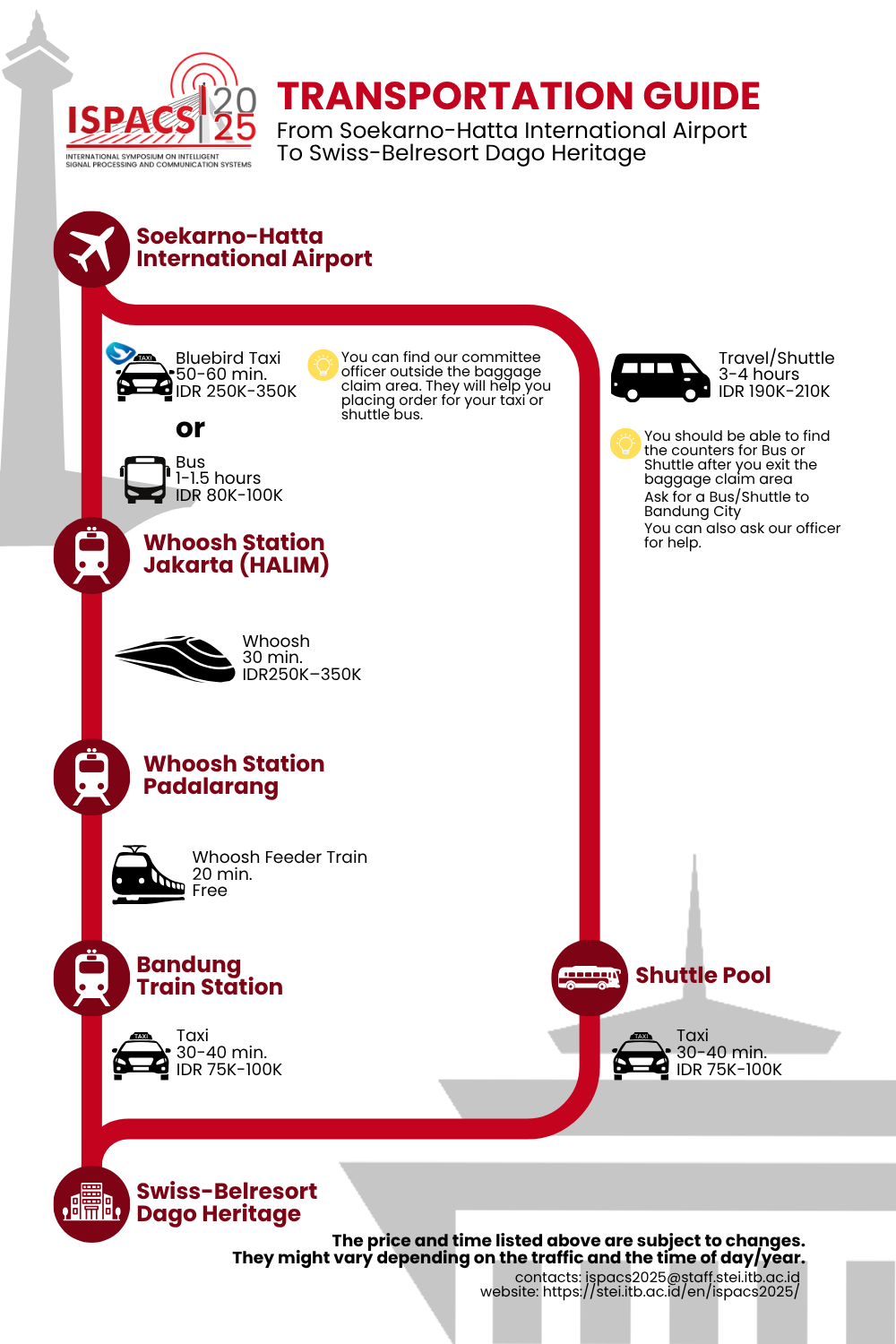
Greetings, ISPACS Participants!
And welcome to Indonesia to all the international participants. If you come to Indonesia through Soekarno Hatta International Airport, this is our recommended method to reach Bandung
- SOEKARNO HATTA INTERNATIONAL AIRPORT
After your safe landing in Terminal 3 and claiming your baggage, you can find our partner Blue Bird Group just outside the baggage claim area by looking for ISPACS 2025 on the counter’s name.
- BLUE BIRD X ISPACS 2025 TICKET COUNTER
You may show your participant’s number and identification. The clerk will offer two options: a direct route to Bandung City, or connecting route via Whoosh High Speed Rail. Don’t be shy to ask any question regarding the trip.
- ON THE ROAD
If you choose direct route, you will be taken directly to Bandung City. If you choose connecting route, you will be taken to Whoosh Station Jakarta at Halim.
- WHOOSH STATION JAKARTA HALIM
You can buy Whoosh ticket at the station’s ticket counter. Inform the clerk that your destination is the Padalarang Station. Get on your train and enjoy the ride on our country’s first High Speed Rail.
- WHOOSH STATION PADALARANG
Make sure that you get off on Padalarang Station as you have to continue your journey using feeder train that will take you from Padalarang Station to Bandung Station in Bandung City.
- BANDUNG CITY
Welcome to Bandung Kota Kembang where ISPACS 2025 will be held. You can join us on Day 1, November 4th to attend the Welcome Reception. Don’t forget to visit tourist attractions and enjoy your stay here.
Other Information
If you would like to know other transportation method or other inquiries, you can contact us at: ispacs2025@staff.stei.itb.ac.id
Download travel flyer.
Submission of Full Papers Deadline (BATCH 2)
SEPTEMBER 10th 20th, 2025
Notification of Acceptance
(BATCH 2)
OCTOBER 5th, 2025
Submission Site
Prospective authors are invited to submit papers reflecting original, unpublished work in the following topics. Papers are at least 4 pages and should not exceed 6 pages including results, figures, and references. Manuscript templates will be made available on the Author Guidelines. Only electronic submissions with PDF files will be accepted via the symposium website.
Authors are expected to present their papers at the symposium upon acceptance and presenting authors are required to register for the symposium. Only papers presented at the symposium will be submitted to IEEE for further review to be submitted to IEEEXplore.
Topics
Communication Systems
- Wireless Communication Systems
- Optical Wireless, Satellite, mmWave Communications
- Full Duplex Wireless, Reconfigurable Intelligent Surfaces
- Joint Radar and Communication Design
- Multiantenna Communication
- Antenna, Radio Propagation and Channel Modelling
- Resource Allocation and Software Defined Networks
- Others
Signal Processing
- Al for Signal Processing and Communication Systems
- Digital Filters and Multirate Signal Processing
- Fast Computations for Signal Processing
- Array and Radar Signal Processing
- Adaptive, Nonlinear and Multidimensional Signal
Processing - Others
Multimedia and Systems
- Speech, Audio, Image, Video Processing and Coding
- Generative Artificial Intelligence
- Multimedia Processing for e-Learning, loT and Al
Applications - Multimedia Technology and Communications
- Deep Learning
- Others
Circuits and Systems
- Circuits and Systems for loT, Al, and Communications
- Analog and Mixed Signal Processing
- Numerical Methods and Circuit Simulation
- Sensors, Devices, and Intelligent Instrumentations
- Machine Learning and Neuromorphic Circuits
- Others
VLSI
- Analog and Digital ICs
- Modelling, Simulation, Synthesis and CAD Tools
- VLSI Architecture for Signal Processing or Al Systems
- Reconfigurable and Adaptive Architectures
- Heterogeneous and Multiprocessor System-on-chip
- Graphic, Video, and Multimedia DSPs
- Others
Human Computer Interaction
- User Experience Design
- Perceptual Interfaces
- Human-Technology Symbiosis
- Artificial Intelligence and loT
- Human-Environment Interactions
- Others
Emerging Technologies in Signal Processing and Communication
ORGANIZING COMMITTEE
.: Trio Adiono, Institut Teknologi Bandung, Indonesia
General Co-Chair: Yeon Ho-Chung, Puk Yong Univeristy Korea
Secretary: Nana Sutisna, Institut Teknologi Bandung, Indonesia,
Ade Irawan, Pertamina University, Indonesia
Nurmeisheila Aghnia, Institut Teknologi Bandung, Indonesia,
Finance Chair: Nur Ahmadi, Institut Teknologi Bandung, Indonesia
Finance Co-Chair: Rian Ferdian, Universitas Andalas, Indonesia
Arieska Nadia, Institut Teknologi Bandung, Indonesia,
Publication Chair: Rahmat Mulyawan, Institut Teknologi Bandung, Indonesia
Publication Co-Chair: Wahyul Amien Syafei, Universitas Diponegoro
Publicity Chair: Akhmadi Surawijaya, Bandung Institute of Technology
Publicity Co-Chair: Emerson Pascawira Sinulingga, Universitas Sumatera Utara
Publicity Co-Chair: Farkhad Ihsan Hariadi, Bandung Institute of Technology
Website Arrangement Chair: Waskita Adijarto, Bandung Institute of Technology
Website Arrangement Co-Chair: Muhammad Iqbal Arsyad, Bandung Institute of Technology
Local Arrangement
- Elvayandri Muchtar, Institut Teknologi Bandung, Indonesia
- Adi Indrayanto, Bandung Institute of Technology
- Ahmad Fitriyansah, Bandung Institute of Technology
- Nopika Dewi Susilowati, Institut Teknologi Bandung, Indonesia
Technical Program Chair: Infall Syafalni, Institut Teknologi Bandung, Indonesia
Technical Program Co-Chair: Agus Bejo, Gadjah Mada University, Indonesia
Technical Program Co-Chair: Dhany Arifianto, Institut Sepuluh November, Surabaya, Indonesia
TPC Members
- Poki Chen
- Ray Guang Cheng
- Chih-Wen Lu
- Nico Suranta
- Rachmad Vidya
- Nicodemus Retdian
- Masayuki Kurosaki
- Roy Simunangkir
- Singo Yoshizawa
- Arif Sasongko
- Irman Idris
- Mervin Tangguar Hutabarat
- Ade Irawan
- Hendra Setiawan
- Husneni Mukhtar
- Rian Ferdian
- Willy Anugrah Cahyadi
IEEE ISPACS ISC/IAC (2025 - )
International Steering Committee
- Takayuki Nakachi (Chair)
- Trio Adiono (Vice Chair)
- Hiroshi Tsutsui
- Chiranut Sa-ngiamsak
- KokSheik Wong
- Shingo Yoshizawa
- Huanqiang Zeng
- Chih-Hsien Hsia
- Pornchai Phukpataranont
- Yeon Ho Chung
- Jing-Ming Guo
- Hao San
- Naoto Sasaoka
- Hiroshi Ochi
- Chin Kuan Ho
- Phooi Yee Lau
- Shou-Sheu Lin
- Sun-Ting Lin
International Advisory Committee
- Tomonori Aoyama
- Shin-ichi Koike
- Byeong Gi Lee
- Lin-shan Lee
- Naohisa Ohta
- Yoshikazu Miyanaga
- Takao Onoye
- Kosin Chamnongthai
- Kaoru Arakawa
- Jen-Shiun Chiang
- Canhui Cai
- Akira Taguchi
- Yoshio Itoh
- Kai-Kuang Ma
- Pichaya Tandayya
- Miin-Jong Hao

